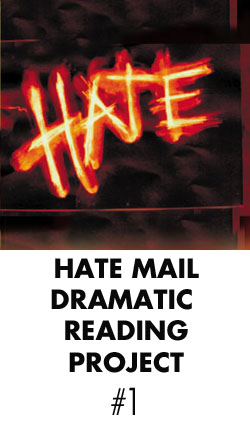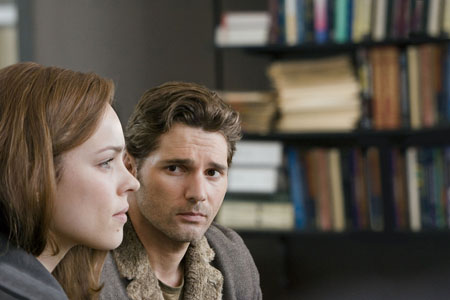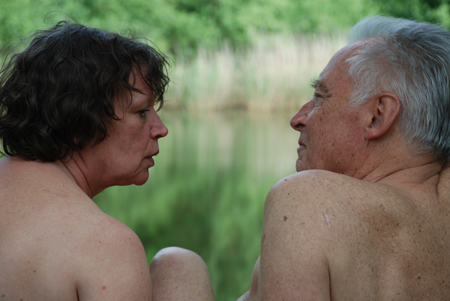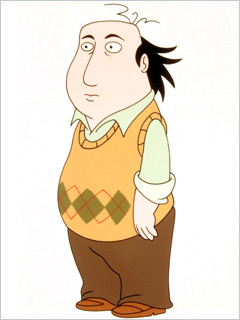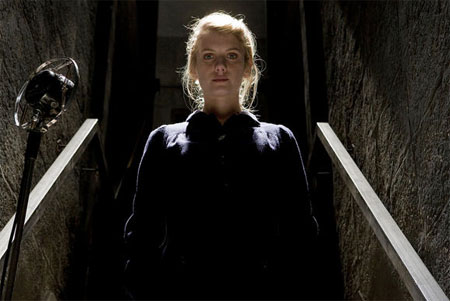
The important thing to understand about Quentin Tarantino is that, as an artist, he has no interest in real life. (Mr. Tarantino’s excellent Crate and Barrel adventure from 2004 does not help his cause, but perhaps there is a reasonable explanation.) Several dour and dense critics, most over the age of 50, cannot see this clear truth before them and have been spending the past few weeks willing their collective blood pressure to rise because they cannot pigeonhole Inglourious Basterds into that neat higher category they desire. (One wonders whether the late Don Edmonds, who gave us the first two Ilsa films, would have faced similar reception in the mid-seventies had he possessed Tarantino’s allure.)
I’ll get to these mostly humorless critics later. They include the normally astute Jonathan Rosenbaum (not this time), Daniel Mendelsohn (who is closer in his assessment, but, not nearly close enough), and the characteristically pompous Ed Gonzalez (who doesn’t seem to ken that Tarantino’s talkathons are part of the point).
The important thing to understand is that Tarantino has never been real. This is the man who didn’t see the humanity in Kirk Blatz’s Reservoir Dogs improvisation. (Blatz played a cop and blurted out the line, “Don’t burn me. I’ve got a kid.” Michael Madsen then told Tarantino, “Quentin, I cannot fucking touch him after he says that to me.” Tarantino’s response? “No, no, I think it’s great. I think it’s wonderful. It brings a whole new element to it.”) This is a man who introduces a kid into the Bride’s domestic brawl with Vernita in Kill Bill Vol. 1 for similar reasons. Character development? Oh, hell no. The kid brings a whole new element. And in Death Proof, when Stuntman Mike is asked why he spends so many hours drinking club soda and lime in a bar, Stuntman Mike says, “A bar offers all kind of things other than alcohol. Women. Nacho grande platters. The fellowships of fascinating individuals like Warren here.” Stuntman Mike turns out to be a psychotic. And it’s easy for any person with a remote understanding of life to see why, given this superficial explanation.
But one should not blame Tarantino for all this. He has, after all, been trying to tell us this for quite some time. Here’s Tarantino in an Entertainment Weekly interview for Kill Bill, Vol. 2:
But one thing that was semi-annoying to me in reading a couple of the reviews for ”Vol. 1” was, ”Oh, this is a very wild technique and style is cranked up and the technique has gone up, but it’s a clear retreat from ‘Jackie Brown,’ and the growing maturity was in there.” ”Clear retreat” says I’m running away from what I did in ”Jackie Brown.” I’ve done it. I don’t have to prove that I can do a [mature character study], all right? And after ”Vol. 1” I don’t have to prove that I can do a good action scene.
Maturity? Leave that for the elder statesmen. Tarantino has done it already. No need to repeat it. So what does Tarantino have to prove exactly? And why does filmmaking have to involve “proving” anything? We expect such claims from a high school jock, not a man in his forties. Maybe it’s because the critical and commercial audiences have expected Tarantino to be real, in the same way that they want Santa Claus, the Easter Bunny, and world peace to be real. Or perhaps Tarantino’s films prove so intoxicating that we really want them to be real. It’s a testament to Hollywood’s failings that Tarantino’s grab bag of cinematic references and outright theft (see Scorsese’s American Boy and Ringo Lam’s City on Fire just for starters) have managed to seem real, particularly for those who cannot see the real before them.
But if Inglourious Basterds were real, then why would we accept Adolf Hitler, Joseph Goebbels, Henrich Himmler, and Martin Bormann hanging around 1944 Paris for a film premiere? Innumerable history books refute this. Why would we accept Lt. Aldo’s Apachesque hunger for Nazi scalps? Or his ridiculously inept effort to impersonate an Italian late in the film? This is a movie that presents Goebbels, sitting with a woman who is not his usual French interpreter. The scene itself equires no additional explanation. It is abundantly clear to any thinking mind that this woman is his fuck buddy. And yet Tarantino feels compelled to insert a quick scene of Goebbels schtupping her. Why? Because this film, contrary to all the high-minded talk, isn’t really about the Holocaust. It is more about America’s cathartic response to violence. There’s no need for the Goebbels scene, but we wouldn’t mind seeing it. After all, when our bloodthirst rises, we won’t remember. And what does this say about us?
There’s no need for a long scene in which the thwacks of one vigilante’s baseball bat carry on at an absurd length — to the point where a histrionic Jeffrey Wells, who clearly has his cardiologist on speed dial, called it “one of the most disgusting violent scenes I’ve ever sat through in my entire life.” More disgusting than the Saw movies? We only hear the sounds. “Morally disgusting, I mean.” Oh. But how?
The vigilante in question, known as the “Bear Jew” by none other than Hitler himself, is played by Eli Roth, known predominantly for helming the Hostel movies, which some have described as “torture porn.” But I don’t think his casting is an accident. This is, after all, a movie in which one Frenchwoman says, a few years before the Cannes Film Festival and Cahiers du cinéma have been established, “I’m French. We respect directors in our country.”
But Tarantino can’t be respected in America. Jonathan Rosenbaum ridicules the film’s title, lambasting it with sics and many other charges, but doesn’t remember that Tarantino’s debut, Reservoir Dogs, bastardized the title of Au Revoir Les Enfants. Rosenbaum suggests that Tarantino’s film is “morally akin to Holocaust denial” and doesn’t understand why Jews are giving Tarantino a free ride for this apparent travesty. Maybe Rosenbaum hasn’t lived a second-generation life of nagging and incessant reminders about the Holocaust. (It’s worth noting Lawrence Bender’s reaction to the script. He called it “a fucking Jewish wet dream.”)
Door #2 reveals Daniel Mendelsohn, a critic so lost in the classics that he can’t familiarize himself with the rampant exploitation film violence of the past four decades. Mendelsohn fixates on the scalping as “post-modern fun,” and reveals his true cathartic cards. Mendelsohn just loves seeing the scalped Nazis, thus proving Tarantino’s point — that we are all equal at the cinema. Mendelsohn is smart enough to determine that Basterds is not real life, but he sees this more as a problem than a possibility. Mendelsohn is also wise enough to pinpoint “the visceral pleasure of revenge,” but isn’t willing to come to terms with his own clear pleasure in seeing the Nazis tortured. Here is a high mind who has fallen into Tarantino’s trap, clearly reveling in the violence. One can see Lt. Aldo recruiting Mendelsohn, had he been born only a few decades earlier, and Mendelsohn capitulating his civilized and critical perch for the “fun” of revenge.
This is not, as Mendelsohn suggests, Tarantino’s “taste for vengeful violence,” but the audience’s. If you find the film’s violence fun or cathartic, you will likely wilt into Tarantino’s snare. But is this really so bad as pretending that you don’t have it in for somebody? Perhaps this is where the virtues of catharsis might be found.
Various film people have been raving about Christoph Waltz as Col. Hans Landa, and with good reason. He offers the most compelling performance in this film, and Tarantino has made him the focus of our rage. Here is a man who asks permission to enter a home but who, like Stuntman Mike’s eating habits, will wolf down a strudel without pausing to taste the meal. (When this occurs, and a Jewish woman disguised as French is forced to eat the strudel, Tarantino lingers through closeups on the cream being served atop the strudel, insinuating a kashrut violation.) Is it so wrong to cheer on the despicable Landa’s inevitable fate (comparable as it is to our blind acceptance of waterboarding)? Or are we complicit, as the film suggests later, in approving of the inevitably real results of our cinematic catharsis?
When the four major Nazis attending the cinematic premiere arrive, Tarantino is quick to highlight their names with optical arrows pointing to their location. Here they are! suggests the underlying semiotics. Do you want me to kill them for you later on in the film? If you have a problem with such underlying autocratic flourishes, this film is probably not for you. But if you are a regular filmgoer, then you might wish to consider these questions anyway.
Since Tarantino has spent a lifetime insisting that cinema may very well be the only focal point that he can start from, I found Basterds‘s candor refreshing and I was able, at long last, to accept a Quentin Tarantino film for what it was. Ed Gonzalez, whose review lede reads like a Philip K. Dick protagonist contemplating the paranoia around him, sadly could not, despite his four star rating (which I suspect I agree with). If you’re determined to see everything as “an allusion” or “a pose,” rather than accepting the visceral discomfort before you, then this film is not for you. Which is not to discount Tarantino’s hubris. A film that dares to call into question our cathartic response is arrogant by its very nature. But if we’re so content to feel outrage about whether a film may or may not be exploiting us, one wonders why we’re so determined to put such energies into the duplicities of narrative rather than the more salient (and fixable) cons before us in the real world. If you tell a lie big enough and keep repeating it, people may eventually come around to believing it. Especially in cinema. Tarantino has told a big lie. And if the town hall lunatics believe that Obama is Hitler, then I suspect that even our most nimble critical minds will have similar thoughts about Tarantino’s vision. For those of us who have accepted (and enjoyed) exploitation films all along, revisiting this source may prove a strange panacea. And if this anodyne lasts beyond our immediate epoch, then it will be Tarantino who has the last laugh. And for this grand illusion, he may rightly deserve the spoils.
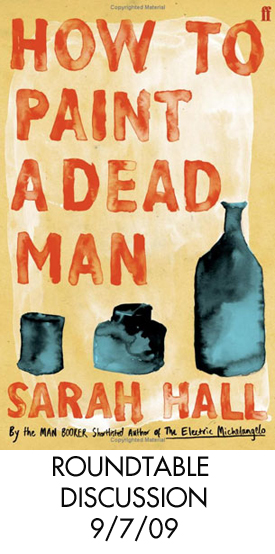 This is just a reminder that, next week, we’ll be devoting this website to a detailed roundtable discussion of Sarah Hall’s How to Paint a Dead Man. The discussion, now in progress, has generated interesting asides on epistemological obstacles, whether second-person perspective is annoying, Procrustean plot structures, Fascist flower girls, The Breakfast Club, Bright Lights, Big City, still life vs. real life, the ineffable nature of artists, David Mitchell’s Cloud Atlas, being “an ambitious little prick” in relation to literature, William Faulkner vs. Virginia Woolf, Led Zeppelin, John Updike’s rules for book reviewing, “failures,” and numerous muted connections throughout the book.
This is just a reminder that, next week, we’ll be devoting this website to a detailed roundtable discussion of Sarah Hall’s How to Paint a Dead Man. The discussion, now in progress, has generated interesting asides on epistemological obstacles, whether second-person perspective is annoying, Procrustean plot structures, Fascist flower girls, The Breakfast Club, Bright Lights, Big City, still life vs. real life, the ineffable nature of artists, David Mitchell’s Cloud Atlas, being “an ambitious little prick” in relation to literature, William Faulkner vs. Virginia Woolf, Led Zeppelin, John Updike’s rules for book reviewing, “failures,” and numerous muted connections throughout the book.

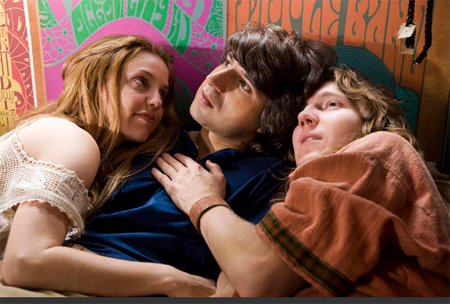


 Estep: “Our love of animals is directly proportionate to our indifference to human beings.” It’s a little bit of an exaggeration. I grew up around all sorts of horses and cats and dogs. To this day, my mom — if I want to get her talking to me for more than two minutes — it has to be about the dogs. So it’s an off-the-nose dialogue where we’re talking about the dogs. But really we’re talking about something else.
Estep: “Our love of animals is directly proportionate to our indifference to human beings.” It’s a little bit of an exaggeration. I grew up around all sorts of horses and cats and dogs. To this day, my mom — if I want to get her talking to me for more than two minutes — it has to be about the dogs. So it’s an off-the-nose dialogue where we’re talking about the dogs. But really we’re talking about something else. 
 Correspondent: Reading this book, I got the sense that the three Ps — pandemic, pestilence, and what’s the other one? plague! — that we’re essentially overstating them. But I want to start off by offering a hypothetical scenario. If I’m sitting at a restaurant, and a Norway rat jumps onto the table and starts nibbling at my sandwich, I’m going to have some understandable concerns. So I guess the question is, if we are in a culture of needless dread about the three Ps, what is the amount of fear that is acceptable for you? Some general terms.
Correspondent: Reading this book, I got the sense that the three Ps — pandemic, pestilence, and what’s the other one? plague! — that we’re essentially overstating them. But I want to start off by offering a hypothetical scenario. If I’m sitting at a restaurant, and a Norway rat jumps onto the table and starts nibbling at my sandwich, I’m going to have some understandable concerns. So I guess the question is, if we are in a culture of needless dread about the three Ps, what is the amount of fear that is acceptable for you? Some general terms.
 Skurnick: You know, you make up a story for what you’re trying to do later, but who knows what you were trying to do?
Skurnick: You know, you make up a story for what you’re trying to do later, but who knows what you were trying to do?